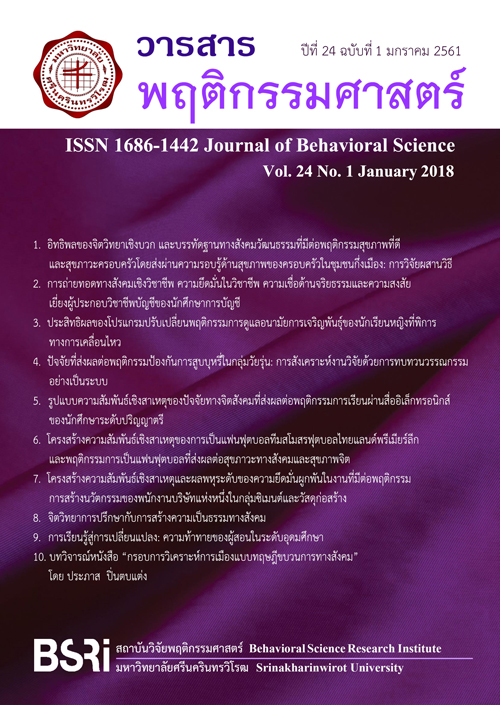จิตวิทยาการปรึกษากับการสร้างความเป็นธรรมทางสังคม
Keywords:
จิตวิทยา, การปรึกษา, ความเป็นธรรม, social justice, psychology, counselingAbstract
จิตวิทยาการปรึกษากับการสร้างความเป็นธรรมทางสังคมนับได้ว่า เป็นคลื่นลูกที่ห้าของการพัฒนาด้านจิตวิทยาการปรึกษาที่ขยายขอบเขตการทำงานไปยังบริบททางสังคมมากขึ้น บทความวิชาการนี้มีวัตถุประสงค์เพื่อแสดงวิวัฒนาการของการพัฒนาด้านแนวคิดทฤษฎีจิตวิทยาการปรึกษาจากคลื่นลูกที่หนึ่งมายังคลื่นลูกที่ห้า นำเสนอตัวอย่างทฤษฎีด้านจิตวิทยาการปรึกษาที่ใช้ในการทำงานกับผู้รับบริการเพื่อสร้างความเป็นธรรมทางสังคม ได้แก่ ทฤษฎีการบำบัดแบบสตรีนิยมและการบำบัดโดยใช้เรื่องเล่า กระบวนการทำงานของนักจิตวิทยาการปรึกษาเพื่อสร้างความเป็นธรรมทางสังคมทั้งในระดับบุคคล กลุ่มและเชิงระบบ ตัวอย่างการวิจัยเพื่อพัฒนาองค์ความรู้ด้านการสร้างความเป็นธรรมทางสังคม ได้แก่ การวิจัยเพื่อให้เกิดการตระหนักถึงความเหลื่อมล้ำทางสังคม การบำบัดเยียวยาและฝึกอบรมนักจิตวิทยาการปรึกษาเพื่อสร้างความเป็นธรรมทางสังคม รวมทั้งการวิพากษ์ที่สำคัญต่อแนวคิดนี้ในส่วนท้าย ประโยชน์ของบทความวิชาการนี้สามารถนำไปประยุกต์ใช้ในการทำงานกับผู้รับบริการทางจิตวิทยาโดยเพิ่มการช่วยเหลือในระดับสังคมและเป็นแนวทางในการทำวิจัยต่อยอดองค์ความรู้ได้
Counseling Psychology and Social Justice Advocacy
Counseling psychology and social justice is the fifth force of advancement in counseling that expands to the social context. This academic paper aims to demonstrate the theoretical evolution of counseling from the first force to the fifth force, illustrate theories used to work with clients to fulfill the social justice part including feminist therapy and narrative therapy. Furthermore, this paper presents the work process for social justice counselor in micro, meso and macro level as well as some research examples showing how to apply social justice knowledge into research for raising more awareness of inequities, treating clients and training social justice counselor. The critiques of social justice counseling are in the last part. This academic paper would benefit people working with clients to add more social interventions and create guideline for researchers to contribute more social justice research in the future.
Downloads
References
วัชธรี ทองอ่อน. (2547). ผลการให้คำปรึกษาแบบกลุ่มตามทฤษฎีสตรีบำบัดต่อความคาดหวังในชีวิตของหญิงบริการทางเพศ. วิทยานิพนธ์ วท.ม. (จิตวิทยาการปรึกษา). ชลบุรี: บัณฑิตวิทยาลัย มหาวิทยาลัยบูรพา.
วันทนีย์ วาสิกะสิน, สุรางค์รัตน์ วศินารมณ์และกิติพัฒน์ นนทปัทมะดุลย์. (2553). ความรู้ทั่วไปเกี่ยวกับสวัสดิการ สังคมและสังคมสงเคราะห์. กรุงเทพฯ: สำนักพิมพ์มหาวิทยาลัยธรรมศาสตร์.
Beckerman, Z., & Tatar, M. (2005). Constructing counseling through narrating adolescence. Journal of youth and adolescence, 34(4), 311-320.
Bell, L.A. (1997). Theoretical foundations for social justice education. In M. Adams, L. A. Bell, & P. Griffin (Eds.), Teaching for diversity and social justice. (3-15). New York, NY: Routledge.
Brown, L. S. (2010). Feminist therapy. Washington, DC: American Psychological Association.
Chen-Hayes, S. (2001). Social justice advocacy readiness questionnaire. Journal of Gay & Lesbian Social Services, 13(1), 191-204.
Chung, R. C., & Bemak, F. P. (2012). Social Justice Counseling: The Next Steps Beyond Multiculturalism. Thousand Oaks: Sage Publications, Inc.
Corey, G. (2012). Theory and Practice of Group Counseling. (8th ed.). CA: Thomson Brooks/cole.
Counselor for social justice. (n.d.). What is social justice in counseling?. Retrieved 24 October, 2017, from https://counseling-csj.org/.
Enns, C. Z. (2004). Feminist theories and feminist psychotherapies: Origins, themes, and variations. (2nd ed.). New York: Haworth.
Fabio, A. D. (2013). Psychology of counseling. New York: Nova Science Publishers, Inc.
Lambie, G. W. & Milson, A. (2010). A narrative approach to supporting students diagnosed with learning disabilities. Journal of counseling and development, 88(2), 196-203.
Mahoney, A. M. & Daniel, C. A. (2006). Bridging the power gap: Narrative therapy with incarcerated women. The prison Journal, 86(1), 75-88.
McGuire, J. K., Anderson, C. R., Toomey, R. B., & Russell, S. T. (2010). School climate for transgender youth: A mixed method investigation of student experiences and school responses. Journal of Youth and Adolescence, 39(10), 1175-1188.
Morningstar, B. I. (2010). Stories that transform: Narrative approaches to spirituality oriented clinical practice. Smith College Studies in Social Work, 80, 286-303.
Nilsson, J., & Schmidt, C. K. (2005). Social justice advocacy among graduate students in counseling: An initial exploration. Journal of College Student Development, 46, 267-279.
Pope-Davis, D. B., Ligiero, D. P., Liang, C., & Codrington, J. (2001). Fifteen years of the
Journal of Multicultural Counseling and Development. Journal of Multicultural Counseling and Development, 29, 226–238.
Pugach, M. R., & Goodman, L. A. (2015). Low-income women’s experiences in outpatient psychotherapy: A qualitative descriptive analysis. Counselling Psychology Quarterly, 28(4), 403-426.
Radermacher, H. L. (2006). Participatory action research with people with disabilities: exploring experiences of participation (Doctoral dissertation). Retrieved from http://vuir.vu.edu.au/484/
Ratts, M. J. (2009). Social justice counseling: Toward the development of a “fifth force” among counseling paradigms. Journal of Humanistic Counseling, Education and Development, 48, 160–172.
Ratts, M. J., & Pedersen, P. B. (2014). Counseling for multiculturalism and social justice: integration, theory, and application. (4th ed.). Alexandria, VA: American Counseling Association.
Ratts, M. J., Singh, A. A., Nassar-McMillan, S., Butler, S. K., & McCullough, J. R. (2016). Multicultural and Social Justice Counseling Competencies: Guidelines for the Counseling Profession. Journal of multicultural counseling and development, 44, 28-48.
Rinfret-Raynor, M., & Cantin, S. (1997). Feminist therapy for battered women: An assessment. In
G. K. Kantor & J. L. Jasinski (Eds.), Out of darkness: Contemporary perspectives on family violence (pp.219–234). Thousand Oaks, CA: Sage.
Sakunpong, N., ChooChom, O., & Taephant, N. (2016). Development of a resilience scale for Thai substance-dependent women: A mixed methods approach. Asian Journal of Psychiatry. 22, 177-181.
Sharf, R. S. (2012) Theories of psychotherapy and counseling: concepts and cases.
Belmont, CA: Brooks/Cole
Speight, S. J., & Vera, E. M. (2008). Social Justice and Counseling Psychology: A challenge to the Profession. In S. R. Brown, & R. W. Lent (Eds.), Handbook of Counseling Psychology (54-65). New Jersey: John Wiley & Son, Inc.
Vera, E. M., & Speight, S. L. (2003). Multicultural competence, social justice, and counseling psychology: Expanding our roles. The counseling psychologist, 31(3), 253-272.
White, M. (1989). The externalizing of the problem in the re-authoring of lives and relationships. Dulwich Centre Newsletter, In Selected Papers. Adelaide, South Australia: Dulwich Centre.
Translated Thai References (ส่วนที่แปลรายการอ้างอิงภาษาไทย)
Arin, N. (2010). Factors affecting the intention for seeking professional psychological help amomg university students. Journal of behavioral science, 16(1), 82-101.
Tong-on, W. (2004). Effect of feminist group counseling to life satisfaction among sex-worker women. Thesis M.S. (counseling psychology). Chonburi: Graduate school, Burapha University.
Wasikasin, W., Wasinarom, S., & Nontapattamadun, K. (2010). Overview of social welfare and social work. Bangkok: Thammasat University printing.
Downloads
Published
How to Cite
Issue
Section
License
Behavioral Science Research Institute, SWU
114 Sukhumvit 23, Bangkok 10110, Thailand.
Tel.02-649-5000 # 17600



